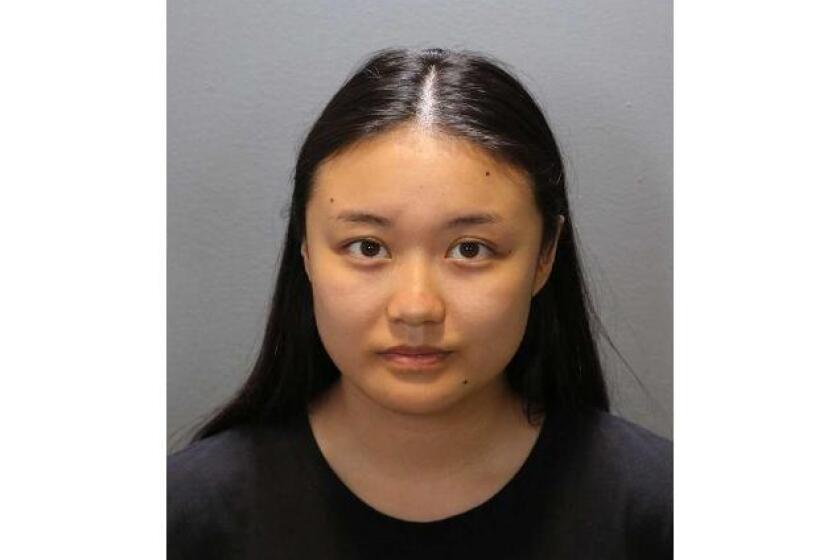Suleman doctor says implanting a dozen embryos was wrong
The Beverly Hills fertility doctor who assisted Nadya Suleman in conceiving octuplets said he made a mistake by implanting her with a dozen embryos at her insistence and against his better judgment.
“I’m sorry for what happened. When I look back at it, I wish I had never done it and it will never happen again,” Dr. Michael Kamrava said Thursday, wiping away tears.
“Do you feel that what you did was wrong?” asked his attorney, Henry Fenton.
“At the time that I did it, I thought I did the right thing,” said Kamrava, who testified before Administrative Law Judge Daniel Juarez in Los Angeles at the Medical Board of California hearing. “When I look back at it, even with all those circumstances, I was wrong.”
The doctor could have his medical license revoked if it is determined that he was grossly negligent in his treatment of Suleman and two other female patients: a 48-year-old who suffered complications after she became pregnant with quadruplets and a 42-year-old diagnosed with advanced ovarian cancer after receiving fertility treatments.
Kamrava, who helped Suleman conceive six other children before the octuplets, said the last time he saw Suleman was when he implanted her with the embryos in July 2008.
At the time, Kamrava said, he considered Suleman infertile and possibly pre-menopausal.
He recommended implanting four embryos, or using embryos Suleman had already frozen with the goal of producing one baby. But she disagreed, he said.
“She just wouldn’t accept doing anything else with those embryos. She did not want them frozen, she did not want them transferred to another patient in the future,” Kamrava said.
“Did you feel you were compelled to put in as many embryos as she wanted?” Fenton asked.
“That was my impression — that I had to go with the patient,” Kamrava said.
He said that he was “apprehensive” after implanting so many embryos but that Suleman agreed to reduce the number of fetuses if she became pregnant with more than triplets.
Kamrava said that he repeatedly tried to contact Suleman to follow up by phone but that she never answered or returned his messages. He assumed she was receiving follow-up care from her Kaiser Permanente doctors.
When he heard news reports Jan. 26, 2009, that octuplets had been born locally, he said he suspected Suleman was the mother.
Then she called him from her room at Kaiser Permanente Bellflower Medical Center and said, “That was me that you heard on the news,” Kamrava testified. He said Suleman told him that there were reporters camped outside her hospital room and that she was unsure what to tell them.
“I told her, ‘Well, tell the truth,’” Kamrava said.
Suleman, 35, of La Habra, has said that she had six embryos implanted and that two divided.
Kamrava said Suleman’s pregnancy made him sad.
“It’s a very risky pregnancy,” he said, tearing up again. “She’s lucky she made it through, both for the babies and her.”
Kamrava said the 48-year-old patient also initially agreed to fetal reduction, but later changed her mind.
He said his concern for her and Suleman preyed on his mind as he handled the third patient’s case.
“It was a very traumatic time for me. Extreme. I have never had anything like that in my life,” he said.
He said he has since taken an ethics course, changed staff in his office and lab, improved his office record keeping and adhered to national guidelines restricting the number of embryos he can implant. If patients do not agree with those guidelines, he said, “I just don’t take them.”
Two doctors have testified on Kamrava’s behalf.
Dr. Parviz Daniels, a general surgeon at Cedars-Sinai Medical Center, testified Thursday that he worked with Kamrava for years and “never heard anything negative” about him. Dr. Suraj Achar, associate professor of clinical medicine at the UC San Diego School of Medicine, conducted a daylong visit to the fertility doctor’s office on short notice and described Kamrava as “remorseful.”
But Dr. Victor Y. Fujimoto, director of UC San Francisco’s In Vitro Fertilization Program, testified earlier this week that Kamrava repeatedly failed to screen Suleman for mental health issues or limit the number of embryos she had implanted or frozen. He said that even four was too many at the time.
Kamrava’s testimony will continue Monday. Suleman and the other two patients are not expected to testify, lawyers said.
molly.hennessy-fiske@latimes.com
More to Read
Start your day right
Sign up for Essential California for news, features and recommendations from the L.A. Times and beyond in your inbox six days a week.
You may occasionally receive promotional content from the Los Angeles Times.







